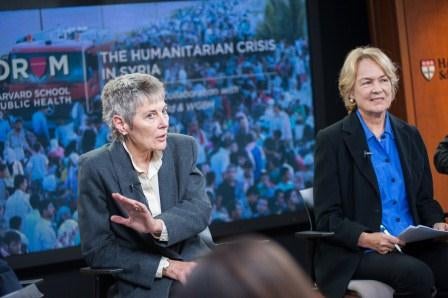 Center director Jennifer Leaning is co-author on a new article in the British Medical Journal. The article offers a critical look at the response of the World Health Organization to Ebola and other humanitarian crises and puts forward a set of six recommendations for future action. The article is excerpted below, with a link to the full version.
Center director Jennifer Leaning is co-author on a new article in the British Medical Journal. The article offers a critical look at the response of the World Health Organization to Ebola and other humanitarian crises and puts forward a set of six recommendations for future action. The article is excerpted below, with a link to the full version.
Human transmission of Ebola virus began in Guinea in December 2013, but inadequate surveillance and alert systems—characteristic of fragile states1—delayed its recognition until March 2014.2 The World Health Organization has acknowledged it was ineffective during this critical early phase.3 Its Guinea office may have slowed down the response,4 while headquarters, fearing political and economic repercussions for countries affected, delayed declaring an international emergency until August 2014.5 The epidemic has caused at least 11 300 deaths from Ebola,6 unquantified indirect excess mortality, and severe societal effects.7 8 The outbreak may not have been preventable, but its calamitous overspill was a quintessential failure of surveillance and containment. This failure has spurred various analyses of the global emergency health response system.9 10 Various groups have formulated recommendations, including those set up by the United Nations secretary general, the Overseas Development Institute,11 the United States Institute of Medicine,12 Harvard University and the London School of Hygiene and Tropical Medicine (LSHTM),13 and WHO itself (the Ebola interim assessment panel).14
WHO is mandated to lead the Global Health Cluster (the global humanitarian system’s main mechanism for coordinating health agencies’ response to crises except refugee scenarios), support member states and non-state organisations in crisis preparedness and response, provide surge resources in emergencies, establish and disseminate technical standards, enforce the international health regulations (IHR) for managing health emergencies, and report attacks on health workers.15 [Full article]

